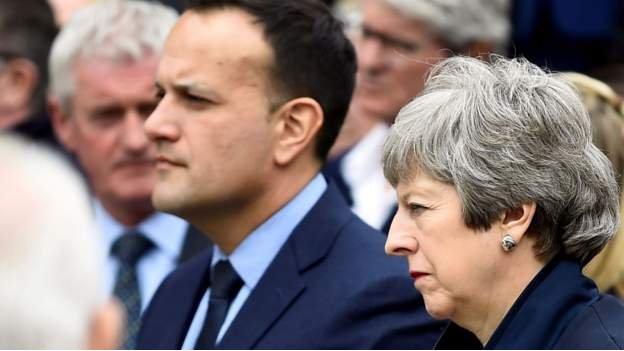Theresa May resignation: What does it mean for Brexit?
- Published

The resignation of Theresa May has clear consequences for the Conservative Party - the starting gun on a leadership contest has been fired.
But what does it mean for Brexit?
The short answer is that both No Deal and No Brexit are now both more likely.
With Mrs May's "bold new Brexit plan" in tatters, there is no vehicle for leaving the EU with a deal, and the default is that the UK's membership will expire on Halloween.
If that is where things appear to be heading in the autumn, some MPs who previously opposed a second referendum might reconsider if it is the best option for avoiding no deal - putting Brexit at risk.
After all, Jeremy Corbyn - who has been reluctant to weaponise Labour's "option" of a public vote - has said the Labour leadership would back a referendum to avoid either "a bad Tory deal" or "no deal at all".
But Mrs May called "on all sides of the debate" to find a compromise.
A question of compromise
The question is whether, in the short term, the language of compromise is seen as an asset or liability by the Conservative leadership contenders.
MPs will be able to choose from a wide range of options - from Rory Stewart and Matt Hancock, who have been emphasising the need to leave with a deal, through to Dominic Raab and Andrea Leadsom, who certainly don't fear no deal.
But polling evidence suggests many of the Conservative grassroots members don't just want Brexit to happen quickly, but they positively favour leaving without a Withdrawal Agreement.
Once MPs have whittled down the contenders to the final two in June, winning over the party faithful will require the remaining candidates to talk tough.
This will mean, at the very least, that "no deal" is back on the table.
If - for example - the eventual contest was between a former Remainer and a Brexiteer - say Jeremy Hunt or Sajid Javid versus Boris Johnson or Dominic Raab - then to attack their opponent on a wide range of issues, including fitness for high office, the former Remainer would have to dismantle any barrier to their support amongst the wider membership by stressing their willingness to leave with no deal.
Deal or no deal
The One Nation Group of Conservatives, who are largely former Remainers such as Nicky Morgan and Amber Rudd, haven't ruled out backing Boris Johnson - so long as he pivots to the position of at least arguing for a deal with the EU.
So, let's just assume for a moment that this is the position any successor to Mrs May adopts.
The only version of the exiting PM's deal which passed the Commons was at the end of January
This was the so-called Brady amendment (after the chairman of the Conservatives' 1922 committee Sir Graham Brady), which called for a deal and support for the Withdrawal Agreement, but minus the contentious Northern Irish backstop.
This backstop is despised by many Brexiteers as it would keep the UK close to EU regulations in the absence of a trade deal.
Confused by Brexit jargon? Reality Check unpacks the basics.
Following that vote, Mrs May said: "There is a limited appetite for change in the EU, and negotiating it won't be easy."
She was right on both counts.
While there were additional reassurances from Brussels around the backstop, there was no major rewrite, never mind replacing it with unspecified "alternative arrangements".
Now, Mr Johnson believes that more robust negotiation is required and this could unlock a deal.
Mr Javid believes technical solutions to the problem of Irish border checks already exist - but that the EU would have to recognise this.
The backstop barrier
The trouble is, so far, the prospect of a change of leader hasn't led to a change of mind in Brussels.
And the Irish Deputy Prime Minister, Simon Coveney, is already warning that the European Union would not offer the next prime minister a better Brexit deal.
He told an Irish radio station: "This idea that a new prime minister will be a tougher negotiator and will put it up to the EU and get a much better deal for Britain? That's not how the EU works."
What he said the EU would contemplate is a longer extension of Article 50, and a further delay to Brexit.
A new Conservative leader committed to a deal may well have to ask for this.
They would begin their tenancy in No 10 at the height of the European holiday season, and time will be short for any renegotiation.
However, unless the EU is willing to reopen the Withdrawal Agreement negotiated with Mrs May, there may be little point in long, drawn out discussions.
Mr Johnson confirmed he wouldn't ask for an extension in any case, declaring that the UK would leave on 31 October with or without a deal.
It's possible some of the legislative legwork for a future deal will be done during the dying days of Mrs May's premiership.
For example, uncontentious aspects of the Withdrawal Agreement, such as citizen's rights, could be incorporated into UK law.
But the contentious issues would remain.
Ending the impasse
Assuming a substantially different deal isn't on offer by October, and the Conservatives are led by a Brexiteer who will come out of the EU no matter what, we could be faced with the following scenarios:
Control of Parliament's legislation is seized once again by MPs opposed to No Deal
The new prime minister receives a bounce in the polls, and calls an election to break the deadlock and get backing for their approach
There is an election because enough MPs vote "no confidence" in the government as a way to stop No Deal
Enough MPs decide to drop their opposition to another referendum - though the means for putting this on the statute books is not entirely clear
The EU really does blink at the last minute and offer a free trade deal minus the backstop
Mrs May warned of 'division and uncertainty' if MPs didn't pass her deal.
In that respect, at least, she was right.
- Published24 May 2019
